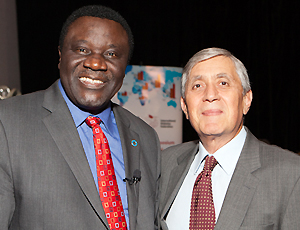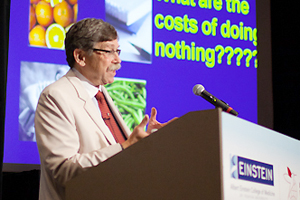

Global Diabetes Symposium
Einstein Launches Global Diabetes Symposium
Einstein took to the world stage in September at the first-ever Global Diabetes Symposium, "Finding the Way to Global Action," led by Einstein's Global Health Center in collaboration with the International Diabetes Federation (IDF).
The symposium brought together an audience of 200, including leaders in diabetes research, prevention, and treatment, who examined the international scale of the disease and discussed the need for global solutions. In addition to presenters representing Einstein and IDF, the symposium featured an international group of experts from other elite universities, industry, and government.

Professor Mbyana with Einstein Dean Dr. Allen M. SpiegelTaking place in the hours before – and a few blocks from – the United Nations High-Level Summit on Non-Communicable Diseases, the symposium sent an important message, according to Dr. Louis Weiss, co-director of Einstein Global Health Center: Diabetes is a global problem, not merely a problem of the "developed world," and so requires a global response.
"There's an epidemic occurring, and we need to look for global solutions before it gets totally out of hand," said Dr. Weiss. "Our goal today is to present the problem and how it's beginning to be addressed."
Einstein has helped lay the foundation for those solutions, he remarked, through work that includes clinical trials with the National Institutes of Health (NIH) and the school's Global Diabetes Initiative, an international research, training, and treatment program.
Einstein's Dean Dr. Allen M. Spiegel kicked off the symposium by noting that the College of Medicine is pioneering global solutions to diabetes in the Bronx, where levels of the disease are some of the highest in New York City. "What's remarkable is that within the Bronx, we have people addressing this problem in extraordinary ways and, at the same a time, a huge global health effort," said Dr. Spiegel, who served as director of the NIH's National Institute of Diabetes and Digestive and Kidney Diseases before coming to Einstein.
Worldwide, diabetes affects 366 million people, according to just-released findings from the European Association for the Study of Diabetes – more than twice the number of previous projections, and a level that wasn't expected to be reached until 2030. But the huge proportions of the epidemic are not the only reason for an international response, said Dr. K.M. Venkat Narayan, professor at Emory University's Rollins School of Public Health who presented at the symposium.

Dr. Richard Deckelbaum poses a critical question"The roots of diabetes include medical risk factors – but also social, economic, cultural, and environmental factors that cross international boundaries," explained Dr. Narayan. And the increasingly global economy can ill afford the costs of diabetes (recently estimated at $465 billion). What's more, Dr. Narayan said, "finding solutions to diabetes requires information and innovation from throughout the world".
"Diabetes is at the crossroads of health and globalization," he added, "and it compels us to think globally."
Discussion topics at the six-hour symposium were just as broad as its worldwide focus. For example, Dr. Meredith Hawkins, director of Einstein’s Global Diabetes Initiative, spoke about malnutrition diabetes, a little-known "third" type of diabetes that targets young people in poor, rural areas, while Dr. Elizabeth Walker, director of the prevention and control core for the Einstein Diabetes Research and Training Center, discussed the role of behavioral interventions in controlling the disease in Uganda. And Dr. Derek Yach, senior vice president for global health and agriculture policy at international food and beverage giant PepsiCo, showed how urban design and agricultural policies can help determine the success of diabetes prevention.
Other speakers rounding out the symposium presentations included Drs. Edwin Fisher, Richard Deckelbaum, Judy Fradkin, Shadi Chamany and Sonak Pastakia.
At the conclusion of the symposium, IDF President Professor Jean Claude Mbanya and IDF Vice President Ruth Colagiuri presented the federation's vision for the future of global diabetes. That vision includes a detailed, 10-year plan for countries to develop individual "national diabetes programs," drawing on best practices to improve health outcomes, prevent the development of type 2 diabetes, and stop discrimination against people with the disease.
The symposium's wide-ranging agenda made it clear that progress against diabetes requires broad thinking – and broad collaboration among nations, scientific institutions, government agencies, businesses, and many others. Fostering that collaboration may be a result of this inaugural meeting.
Alluding to the international response to HIV/AIDS as an example of how diverse groups can successfully work together around a health crisis, Dr. Narayan noted, "Diseases like HIV and diabetes are larger than the medical system. The solutions to diseases like these are very wide, so we have to build a strong advocacy organization that involves everyone. Diabetes is an area where cooperation is more important than competition."
To learn more, and to view presentations from the Global Diabetes Symposium.
Posted on: Wednesday, October 19, 2011
















Tablet Blog